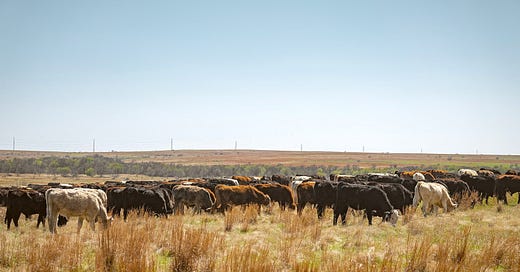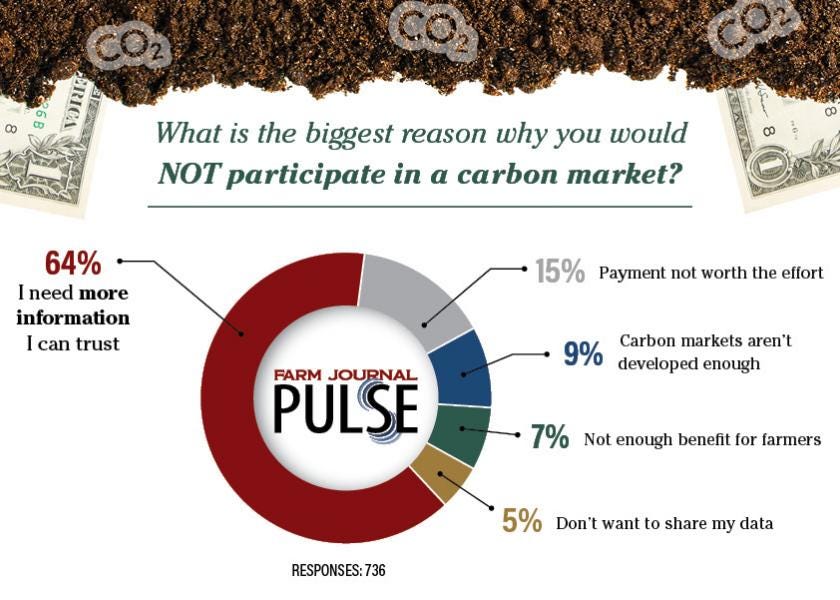🤠Taming the Wild West of Soil Carbon
The Growing Climate Solutions Act and The Government's Role in Soil Carbon Markets
Welcome to the Soil Carbon Regeneration newsletter, an effort from Grassroots Carbon to promote transparency and information on this new world of soil carbon markets. In this issue, we will be discussing the government’s emerging role in promoting soil carbon sequestration, and why the USDA and Congress want a more robust voluntary soil carbon market for farmers and ranchers.
A quick procedural note - this week we transitioned our newsletter to Substack from our own website. Please email me at kevin.silverman@buildgrassroots.com if you have any questions.
In late June, the U.S. Senate passed the Growing Climate Solutions Act by a 92-8 vote, supported by a variety of corporate and non-profit supporters ranging from the Farm Bureau to Microsoft to The Nature Conservancy. The bill allocates $4 million to establish an advisory council composed of government officials, farmers, ranchers, and private landowners. The council will work with USDA Secretary Tom Vilsack over a 270-day period to build out a “Greenhouse Gas Technical Assistance Provider and Third-Party Verifier Certification Program”, as well as list out accepted “USDA certified” protocols.
Though the bill will face a battle in the House of Representatives before potentially reaching President Biden’s desk, we can glean a few key takeaways:
The focus is on building landowner, farmer, and rancher trust, as well as making sure certified bodies are focused proactively on the supply side. Nearly 65% of farmers responded to a Farm Journal survey stating that needing “more information they could trust” is the key reason not to participate in a carbon market. In particular, the bill hones in on “socially disadvantaged farmers and ranchers” and on reducing barriers to entry to carbon markets.
The government wants to operate as an oversight body for agriculture and forestry credits. With only $4 million allocated in the bill, the oversight body will have limited resources but significant discretion. Due to the political process and built-in working period, we will not likely see the Advisory Council’s recommendations implemented until 2023, while the soil carbon market will continue to grow.
Agriculture and climate change as overlapping issues can lead to broad consensus and bipartisanship. Though the infrastructure bill, which includes significant rural infrastructure and broadband investment, remains in limbo, the growing political importance of America’s food and climate resiliency will keep this intersection in focus, be it at a local, state, or federal level.
However, advocacy groups like the National Sustainable Agriculture Coalition (NSAC) believe the government should focus on federal programs to fund climate-friendly agriculture. Their view is rooted in the failures of historical marketplaces like the Chicago Climate Exchange. That’s what’s so compelling about the Growing Climate Solutions Act: while maintaining rigor and expertise in all the necessary carbon market principles, it can provide flexibility and security to all stakeholders with minimal government spending, iterating for the same concerns as NSAC at a fraction of the cost. This is not a cure-all, but a pragmatic step in the right direction. Funding federal grant programs through bodies like the NRCS would face its own political hurdles, as it would require the allocation of billions of dollars. Furthermore, policy work from advocacy groups like Carbon180 and Climate21 provides clear roadmaps moving forward with both carbon markets and federal programs, especially with the 2023 Farm Bill coming up.
What does this mean for farmers and carbon buyers making a decision right now? Given the timeline the government is working on, there is no clear answer yet. Carbon project managers and marketplaces should understand how they fit into the government’s potential framework. There should also be alignment with the bill’s focus on removing barriers to entry and providing equitable compensation to American farmers. Overall, the Growing Climate Solutions Act is a telling step as to how the government will support soil carbon markets and land stewards, though the vast majority of the details remain unwritten.
In case you missed the webinar on "Soil Carbon Sequestration: How Nature Captures and Stores Carbon" with Russ Conser, CEO of Blue Nest Beef, last week, we now have the video available on YouTube:
Please check it out and let us know your thoughts. We also have a LinkedIn Group! Feel free to join here.




